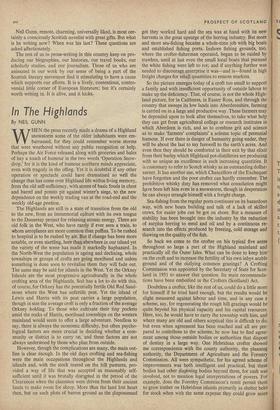In The Highlands
By NEIL GUNN WHEN the press recently made a drama of a Highland snowstorm some of the older inhabitants were em- barrassed, for they could remember worse storms that were weathered without any public recognition or help. Perhaps the Air Force released along with groceries and bales of hay a touch of humour in the two words 'Operation Snow- drop,' for it is the kind of humour northern minds appreciate, even with tragedy in the offing. Yet it is doubtful if any other operation or spectacle could have dramatised so well the change that has come over Highland life within living memory, from the old self-sufficiency, with stores of basic foods in chest and barrel and potato pit against winter's siege, to the new dependence on the weekly trading van at the road-end and the weekly old-age pension.
The Highlands are still in a state of transition from the old to the new, from an immemorial culture with its own tongue to the Dounreay project for releasing atomic energy. There are old folk in the West, who have rarely if ever seen a train, to whom aeroplanes are more common than puffins. To be rushed to hospital is to be rushed by air. But if change has been more notable, or even startling, here than elsewhere in our island yet the variety of the scene has made it markedly haphazard. In the North-West the population is ageing and declining, whole townships or groups of crofts are going moribund and unless something is done soon to revitalise them they will fade out. The same may be said for islands in the West. Yet the Orkney Islands are the most progressive agriculturally in the whole crofting area of the Highlands. Soil has a lot to do with this, of course, for Orkney has the potentially fertile Old Red Sand- stone where the West has unfertile peat. Yet the island of Lewis and Harris with its peat carries a large population, though in size the average croft is only a fraction of the average Orkney holding. To those who cultivate their tiny pockets amid the rocks of Harris, moribund townships on the western mainland would seem to offer a large adventure. Needless to say, there is always the economic difficulty, but often psycho- logical factors are more crucial in deciding whether a com- munity or district is to carry on, and these factors are not always understood by those who plan from outside.
However, though the complications are many, the main out- line is clear enough. In the old days crofting and sea-fishing were the main occupations throughout the Highlands and islands and, with the stock reared on the hill pastures, pro- vided a way of life that was accepted as reasonably self- sufficient until it was brutally disrupted in the period of the Clearances when the clansmen were driven from their ancient lands to make room for sheep. More than the land lost heart then, but on such plots of barren ground as the dispossessed got they worked hard and the sea was at hand with its new harvests in the great upsurge of the herring industry. But more and more sea-fishing became a whole-time job with big boats and established fishing ports. Inshore fishing grounds, too, where the crofter-fisherman operated, began to be raided by trawlers, until at last even the small local boats that pursued the white fishing were left to rot; and if anything further was needed to discourage enterprise it was—and is—found in high freight charges for small quantities to remote markets.
So the picture emerges today of a croft too small to support a family and with insufficient opportunity of outside labour to make up the deficiency. That, of course, is not the whole High- land picture, for in Caithness, in Easter Ross, and through the country that sweeps its low lands into Aberdeenshire, farming is carried on in a large and productive way. These farmers may be depended upon to look after themselves, to take what help they can get from agricultural college or research institutes in which Aberdeen is rich, and so to combine grit and science as to make 'farmers' complaints' a solemn topic of perennial humour. If ever there is danger of humanity going under, they will be about the last to say farewell to the earth's acres. And even then they should be comforted in their exit by that elixir from their barley which Highland pot-distilleries are producing with so unique an excellence in such increasing quantities. It is customary to refer to Scotch whisky as an outstanding dollar- earner. It has another use, which Chancellors of the Exchequer have forgotten and the poor crofter can hardly remember. The prohibitive whisky duty has removed what consolation might have been left him even in a snowstorm, though in desperation he can always strangle himself with a freight charge.
Sea-fishing from the regular ports continues on its hazardous way, with new boats building and talk of a lack of skilled crews, for easier jobs can be got on shore. But a measure of stability has been brought into the industry by the reduction of surplus herring to meal and oil and by a continuous re- search into the effects produced by freezing, cold storage and thawing on the quality of the fish.
So back we come to the crofter on his typical five acres throughout so large a part of the Highland mainland and practically all the Outer Isles. What can be done to keep him '- on the croft and to increase the fertility, of his own inbye arable ground and of the outlying common grazings? A Crofting Commission was appointed by the Secretary of State for Scot- land in 1951 to answer that question. Its main recommenda- tions have been embodied in the Crofters (Scotland) Act.
Doubtless a crofter, like the rest of us, could do a little more for himself if he tried hard enough, but the results would be slight measured against labour and time, and in any case a scheme, say, for regenerating the rough hill grazings would be quite beyond his physical capacity and his capital resources. Here, too, he would have to carry the township with him, and where many are old and others sceptical this is difficult to do, but even when agreement has been reached and all are pre- pared to contribute to the scheme, he now has to find agree- ment among those outside bodies or authorities that dispose of destiny in a large way. One Hebridean crofter showed me correspondence with the county authority, the planning authority, the Department of Agriculture and the Forestry Commission. All were sympathetic, for his agreed scheme of improvements was both intelligent and practical, but these bodies had other disposing bodies beyond them, for cash was involved, not to mention legal interpretations of powers. For example, does the Forestry Commission's remit permit them to grow timber on Hebridean islands primarily as shelter belts for stock when with the same expense they could grow more timber elsewhere? Anyway, all that grew out of the crofter's efforts was the correspondence, until he was unable to cope with it, and the scheme lapsed.
It is just such a case as this (and there are many varieties of it) that the Crofting Commission decided could best be dealt with,by a small creative body, with powers to carry it through from its initiation to its completion. Such a Crofters Commis- sion—as it is decided to call it—should be of immense help in reconditioning the crofting areas and restoring some of the old social life, which is a way of life and still has a powerful appeal. But some kind of ancillary employment Auld still be needed to provide a reasonable livelihood today. In Lewis the Harris tweed industry supplies this on a considerable scale. The crofters are given the yarn from the spinning mills in Storno- way and weave the tweed on their cottage looms in their own time and generally with the assistance of the family. In Orkney holdings are large and fertile enough for full-time employ- ment; in Lewis they are neither, but tweed-weaving can provide the extra cash.
There are wide areas, however, where part-time employ- ment of any kind is difficult to find, and this is the major problem in the case of the small croft, which means the vast majority of crofts. The Crofting Commission found it had to give a lot of thought to this difficulty and made many sugges- tions, particularly with regard to an extension of forestry in the West, for timber-growing lends itself to part-time employment.
Perhaps the Forestry Commission needs an extension of its powers to include consideration of other aspects of Highland life which are within the remit of the North of Scotland Hydro- Electric Board and which that board has so liberally and con- structively interpreted. For certainly these are the two major regenerative forces at work in the Highlands today. In the glen where I live they have brought about a revolution in a few years: increasing population, larger school attendance, new stone-built houses and new social amusements. Even those who, mostly as sightseers, deplored beforehand the havoc that dams and pylons would play with this wonderful Highland scenery that so liked to be visited, have had to admit that even the famed beauty of Glen Affric has been enhanced by the Hydro Board's new water levels. Poles—dressed trees—march- ing across a barren moor or hill, bringing light and power to a remote community, are a heartening sight to those who know the Highlands and islands. If piped water could be carried along with an equal decision, even croft houses could provide those amenities which an ever-growing tourism de- mands, and so benefit both the house and the housewife's purse. If, further, as the Forestry Commission and the Hydro Board extend their good works, light industries could be set up to deal with the by-products of forestry and with other native resources, the present lack of suitable employment over wid, areas could be met in exactly the right way. Time will be needed, but, by all the signs, a real future for the Highlands is beginning to be discernible in the thinning grey mist, and it would expand its shape wonderfully if the Government had, a close look at what Norway and Iceland have done in protecting their inshore fisheriei and even what the Government itself has just done in an agreement with the Faroes.
Meanwhile the Women's Rural Institutes, the Highlands and Islands Film Guild, the Community Drama Association and similar lively concerns are busy with those interests and enter- tainments which defeat dullness and so keep the feet of the young from wandering too readily. For the psychological problem may lie at a deep level, but it, too, is beginning to be understood.


















































 Previous page
Previous page